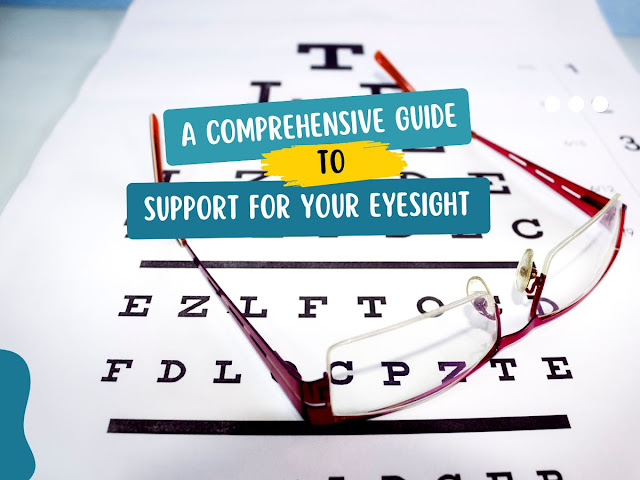 |
| A Comprehensive Guide to Support for Your Eyesight |
Understanding the Importance of Eye Health
The Fundamentals of Eyesight
Common Eye Conditions: Various conditions can affect our eyesight from nearsightedness to glaucoma. Knowing about these common issues can help us proactively protect our vision.
Factors Affecting Eye Health
Age and Eyesight: Our eyesight naturally changes as we age. Being aware of these changes can help us adapt and seek appropriate support.
Lifestyle Choices and Eye Health: Everything from diet to screen time can impact our eye health. Making informed choices can go a long way in supporting our vision.Environmental Factors: Air pollution and UV radiation can also affect our eyesight. Understanding these influences can help us mitigate potential harm.
Proactive Measures for Maintaining Healthy Eyes
Healthy Diet and Nutrition
Foods to Include in Your Diet: Foods rich in antioxidants, such as leafy greens and fish, can provide the necessary nutrients for healthy eyes.
Proper Eye Care Habits
Tips for Preventing Eye Strain: From adjusting screen brightness to taking breaks, there are simple steps we can take to reduce eye strain.
Protecting Your Eyes from UV Rays: Wearing sunglasses and avoiding direct sunlight can help protect our eyes from harmful UV radiation.
Lifestyle Changes for Better Vision
Importance of Regular Exercise: Exercise not only benefits our overall health but can also support our eyesight by improving blood circulation.
Screen Time Guidelines: Limiting screen time and following the 20-20-20 rule (every 20 minutes, look at something 20 feet away for 20 seconds) can reduce digital eye strain.
Adequate Sleep and Eye Health: Getting enough quality sleep is essential for maintaining optimal eye health.
Natural Remedies and Supplements for Eye Support
Herbal Remedies for Eye Health
Bilberry Extract: Known for its antioxidant properties, bilberry extract may help improve night vision and reduce eye strain.
Ginkgo Biloba: This herb is believed to improve blood flow to the eyes, potentially benefiting overall eye health.
Essential Supplements for Eye Support
 |
| Eyevita Plus - A Comprehensive Guide to Support for Your Eyesight |
Its Essential nutrients are contained in each Eyevita Plus pill to help alleviate eye tiredness, enhance visual clarity, and strengthen the eyes' defense against dry eye syndrome. Blue light, which is released by electronic devices, can potentially have harmful consequences that Eyevita Plus guards against.
Lutein and Zeaxanthin: These antioxidants are found in green leafy vegetables and can help protect the eyes from harmful light.
Vitamin A and Beta-Carotene: Essential for vision, these nutrients can be obtained from carrots, sweet potatoes, and other orange-colored fruits and vegetables.
Technology and Tools for Improved Eyesight
Blue Light Blocking Glasses
How to Choose the Right Glasses: When selecting blue light-blocking glasses, consider factors like lens quality and comfort to find the best fit for your needs.
Eye Exercises and Vision Therapy
Simple Eye Exercises to Improve Vision: From eye rotations to near-far focus exercises, various techniques can enhance vision naturally.
Assistive Technologies for Vision Impairment
Magnifiers and Screen Readers: Technology tools like magnifiers and screen readers can assist individuals with vision impairment in daily tasks.
Smart Devices for the Visually Impaired: Smartphones and other devices offer accessibility features like voice assistants and screen magnification, making them valuable resources for those with vision challenges.
Maintaining Long-Term Eye Health
Importance of Regular Eye Check-ups
What to Expect During an Eye Exam: Eye exams typically involve vision tests, eye health evaluations, and discussions about any concerns or symptoms.
Early Intervention and Treatment Options
Seeking Professional Help: Consulting an eye care specialist is crucial for accurate diagnosis and treatment of vision issues.
Healthy Habits for Lifelong Eye Support
Eye-Friendly Workspaces: Proper lighting, ergonomic setups, and regular breaks can create a conducive environment for eye health.
Balancing Screen Time with Outdoor Activities: Spending time outdoors and engaging in activities that don't involve screens can benefit overall eye health.
Conclusion
Recap of Key Points: Understanding the fundamentals of eye health, taking proactive measures, exploring natural remedies, utilizing technology tools, and maintaining long-term eye health are key components of supporting your eyesight.Importance of Prioritizing Eye Health: Our eyes are precious and deserve our care and attention. Prioritizing eye health can enhance our quality of life and overall well-being.
Encouragement for Taking Action: By implementing the strategies and tips shared in this guide, you can take proactive steps towards maintaining healthy eyes and preserving your vision.
A Comprehensive Guide to support for your eyesight - FAQs
How often should I have my eyes checked?
Generally, eye exams are recommended every 1-2 years for adults. If you're over 65, have concerns, or wear corrective lenses, you might need them more often.
Are there any specific foods that can improve eye health?
Yes! Leafy greens, fatty fish, and citrus fruits are all great for eye health. They contain lutein, omega-3s, and vitamin C, all important for eye function.
Can eye exercises improve my vision?
Eye exercises won't directly improve blurry vision from nearsightedness, farsightedness, or astigmatism. However, they can help with eye strain and focusing issues in some cases. Talk to your eye doctor to see if they'd be beneficial for you.
How to protect your eyes?
Here are some key ways to protect your eyes: “Diet: Eat a healthy diet rich in leafy greens, fatty fish, and citrus fruits for essential vitamins and nutrients.” “Eye Exams: Get regular eye exams, typically every 1-2 years, or more often if needed.” “Screens: Give your eyes a break from screens! Follow the 20-20-20 rule: every 20 minutes, look at something 20 feet away for 20 seconds.” “Sunglasses: Wear sunglasses that block UVA and UVB rays to shield your eyes from sun damage.” “Safety: Use protective eyewear when playing sports or doing activities that could cause eye injury.”
